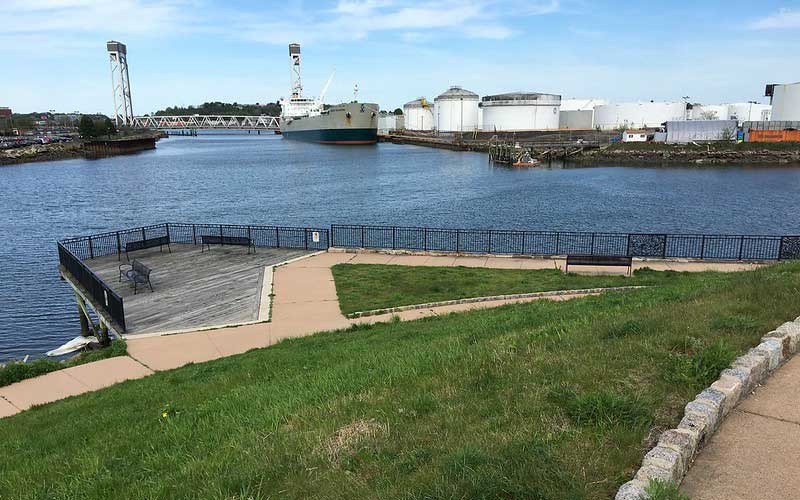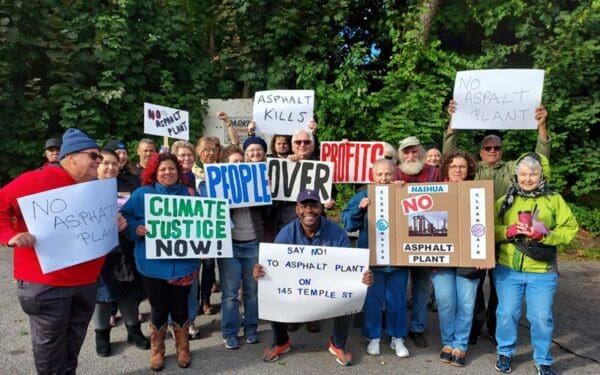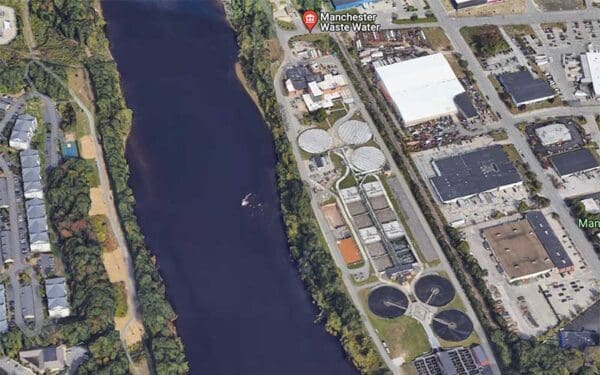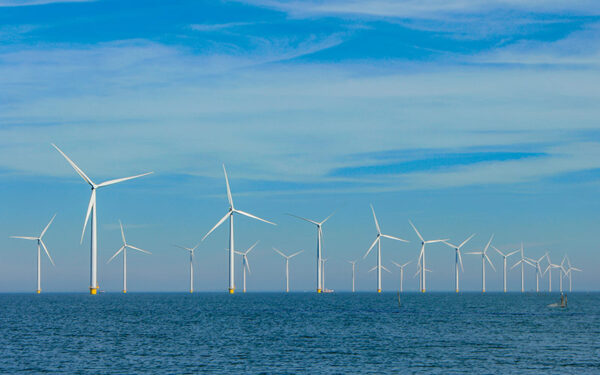
Eversource wants to build a dangerous electric substation in East Boston's Eagle Hill neighborhood. Local residents – many of whom have limited proficiency in English – oppose the plan. But the state continues to favor the interests of industry over people and the environment. Photo: Ed Lyons, CC BY-NA 2.0
Despite widespread opposition from residents, Eversource continues to plow ahead with its plan to build a massive electrical substation in East Boston on the banks of Chelsea Creek. The site sits feet away from a small nature preserve, a children’s playground, and the water itself.
CLF and our partners at GreenRoots have joined the East Boston community to challenge this dangerous project. But, over eight years and in three separate proceedings, state officials have favored the interests of industry over the health and safety of people and the environment.
In the latest installment of this saga, the Massachusetts Energy Facilities Siting Board (Board) voted 7 to 1 to approve a request by Eversource to bypass the last 14 state and local environmental permits needed to build this facility. This disheartening decision eliminated a series of critical public processes, robbing the community of the ability to have a voice in shaping its future.
CLF advocates have appealed this decision to the Massachusetts Supreme Judicial Court. We are asking the court to invalidate the Board’s decision to grant the environmental permits.
Environmental Justice Community Doesn’t Need or Want This Substation
East Boston’s Eagle Hill is a quiet neighborhood. To the north, this mostly-residential area borders Chelsea Creek. The rolling hills of the Condor Street Urban Wild offer a view of the water, with tarp-covered piles of salt framing the Chelsea bank. Hazardous contaminants sit in the ground below, capped with layers of earth and greenery – a pristine image among a heavily industrialized landscape achieved through the years-long efforts of neighborhood activists. Logan Airport jet fuel storage tanks, industrialized businesses, and a police station surround the site and nearby homes and schools.
Those living nearby know the creek swells during storms and heavy rainfall. Residents question the safety of living next to an electrical substation built on a site subject to flooding. But as has happened so often before, they have been unable to meaningfully influence the planning, siting, and regulatory processes that would place this new hazard near their homes.
Complicated Process Made Incomprehensible to Many Residents
The energy siting process is already complicated for people who spend their days and nights working and caring for their families – rather than studying siting law. Well-resourced utilities dictate the terms of projects and have the time, money, and expertise to move them forward. Language barriers make meaningful public participation even harder – as does the lack of regard for residents with limited-English proficiency.
East Boston is a community of immigrants and their descendants. Over half of its households speak Spanish at home. Across the Chelsea Creek, around 70% of Chelsea residents speak a language other than English.
By law, the public must have the opportunity to provide input in the decision-making process to site major new energy infrastructure. That means that, legally, the Board and its parent agency, the Executive Office of Energy and Environmental Affairs, must ensure that residents can access information, services, programs, and opportunities, even if they don’t speak English. Yet, in the first approval process for the substation, the Board consistently failed to provide adequate interpretation services. Energy officials even deemed such services “too disruptive to the proceedings.” When written translations were provided, the Spanish version was often misleading or lacked key details.
Community members fluent in both English and Spanish pointed out these inaccuracies. But there was no action to fix them. As a result, Spanish-speaking residents were systematically left out of the process, rendering meaningful public engagement impossible.
In 2020, CLF and GreenRoots filed a Title VI discrimination complaint before the EPA against Massachusetts energy agencies for their failure to provide accurate translation and interpretation services. But even as our complaint made its way through the system, the Siting Board granted its second approval of the substation in February 2021. Thanks to CLF and GreenRoots’ advocacy, during the third request for approval in February 2022, the Board provided written translation for all state materials, interpretation at all meetings and hearings, and granted its final decision in English and Spanish.
State Votes to Bypass Critical Environmental Permits
Given the Board’s disregard for the East Boston community between 2014 and 2022, it should come as no surprise that it voted to fast-track the project late last year. By allowing Eversource to avoid separate processes to obtain 14 state and local environmental permits, the state has once again put industry before people – even though the people have clearly said they do not want or need this dangerous facility in their neighborhood.
The Board’s third approval also violates the provisions of the waterways law and 2021 Climate Roadmap Law. The law requires the state to reduce the potential for unfair or inequitable burdens from new energy projects on vulnerable populations. So, a project like Eversource’s electric substation in Eagle Hill should bring more benefits than harms to the community. That’s why CLF and GreenRoots appealed this decision to the Massachusetts Supreme Judicial Court. We are asking the court to invalidate the Board’s decision to grant the environmental permits.
Officials Must Listen to Communities – and Communities Must Have a Say in Shaping Their Future
As a result of this eight-year campaign to stop the substation, the Board voted in early January 2023 – in response to a motion from CLF and GreenRoots – to consider improving its practices to review facilities that impact environmental justice populations.
We will not give up in this fight to hold the State energy officials responsible for their actions. No one should be shut out of a process that could have catastrophic implications for their neighborhood simply because of the language they speak, their race, or how much money they make. It’s not only unlawful – it’s plain wrong.
*An earlier version of this story was published in July 2020.




